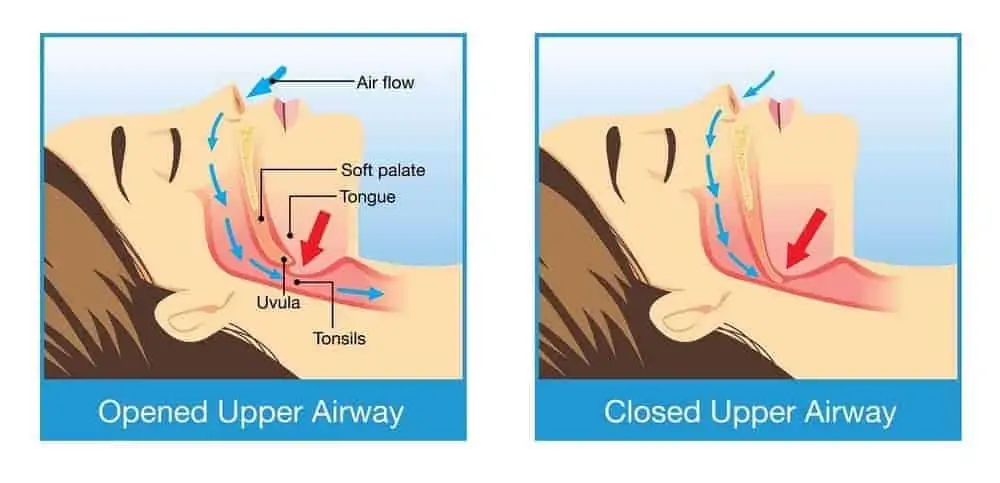• Jun 18, 2024 • Read in ~10 mins
— By Katherine Dilworth and Dr. Sandip Roy.Snoring isn’t just an annoying nighttime noise; it can be a relationship killer and a health hazard.
When you share a bed with a snorer, waking up refreshed is a rare luxury.
Your partner’s chronic and loud snoring can fracture your sleep at many points during the night. Your mornings often start with exhaustion, and your days go in a sleepy haze.
This typically builds an unspoken resentment toward your snoring partner.
FYI, most snoring happens because of weak throat muscles, causing oral soft tissues to vibrate as the air passes during sleep.
Table of Contents
Here are 11 tips for sleeping beside a snorer without using earplugs:
1. Clean Up Your Co-Sleeping Area
Many objects around your sleeping area can make you snore because of an allergic reaction. A clean sleeping environment can reduce those allergens.
An undetected allergy can lead you to snore loudly, such as a plant in your bedroom, or sheets that haven’t been washed in a long time and are teeming with microscopic germs.
Rugs and covers are notorious for collecting dust mites.
- Dust the entire room. Clean up the areas around your bed to get rid of any hidden allergens.
- Every week, spray-sanitize your bedroom and let it air for a few hours before sleeping in it.
- Throw out anything in your bedroom that you haven’t used in weeks.
- Declutter ruthlessly and make your bedroom minimalist.
2. Encourage Mouth & Throat Exercises
Specific exercises can strengthen the muscles around the airway and may reduce snoring.
There is no universally accepted standard treatment for primary snoring or snoring with mild obstructive sleep apnea (OSA). But research seems to offer some good news for snorers.
A Brazilian team found that mouth and tongue workouts reduced snoring frequency by 36% and total snoring power by 59% in those with primary snoring or mild OSA (Ieto & Kayamori, Effects of oropharyngeal exercises on snoring, 2015).
Here are the tongue and mouth exercises the participants did, and that you can try:
- Pushing the tip of the tongue against the roof of the mouth and sliding the tongue backward.
- Sucking the tongue upward against the roof of the mouth, and pressing the entire tongue against the roof of the mouth.
- Forcing the back of the tongue against the floor of the mouth while keeping the tip of the tongue in contact with the bottom, and front teeth.
- And elevating the back of the roof of the mouth and uvula while saying the vowel “A.”
Simple yoga breathing techniques also help reduce snoring and strengthen the diaphragm. As an added bonus, yoga exercises also help reduce stress levels and calm the mind.
3. Use Nasal Sprays to Unblock Nasal Passages
Snoring is frequently caused by a blocked or congested nose (allergic rhinitis). So, over-the-counter or prescription sprays can help (but consult your doctor for long-term use).
A nonmedical way is to rinse a stuffy nose with salt water or saline nasal sprays. They are generally safe for allergies and colds. You may use them as often as you like, but too much use may cause a burning sensation in the nasal mucosa.
Medicated nasal sprays that ease breathing and reduce snoring contain:
- antihistamines (azelastine, ebastine, olopatadine),
- steroids (mometasone, beclomethasone),
- decongestants (pseudoephedrine),
- mast-cell inhibitors (cromolyn),
- anticholinergics (ipratropium),
- saline or normal salt water.
Consult your doctor. Do not self-medicate with prescription medicines.

4. Humidify the Bedroom
Dry air is a common but often overlooked factor that can irritate the throat and nasal passages, potentially worsening snoring.
Dry air in your bedroom can make the linings of your throat and nasal passages dry and sore as air passes through. This may cause swelling and narrowing of the airways.
Narrow airways can cause turbulent airflow during breathing, leading to more vibrations and, therefore, more snoring.
Using a humidifier to maintain optimal moisture levels in the bedroom can soothe these irritated tissues, potentially reducing snoring. It’s a simple yet effective step to consider in your anti-snoring toolkit.
5. Ask Them (And Roll Them) To Sleep On Their Side
Sleeping on the back can worsen and even cause snoring. Sleeping on your side is usually a good way to stop snoring.
When a person lies on their back, gravity pulls the tongue and soft palate backward, narrowing the airway and increasing the likelihood of snoring. Side sleeping solves this by allowing the airways to expand, reducing the vibrations that cause snoring.
Studies have shown that positional therapy, including side sleeping, can significantly reduce snoring in many individuals. Research during the past 10–20 years shows that positional therapy (PT) has a significant influence on the apnea–hypopnea index (Ravesloot & van Maanen, 2013).
Using a body pillow can make it easier to maintain this position throughout the night, further enhancing its anti-snoring benefits.
6. Support Their Weight Loss Efforts
Excess weight, especially around the neck area, is a well-known risk factor for snoring.
The extra fatty tissue compresses the throat, narrowing the airway and making it more susceptible to collapse during sleep. This collapse leads to the vibrations that produce the snoring sound.
Weight loss can significantly reduce or even eliminate snoring.
This research found that in most cases, the combination of weight loss, sleeping on one’s side, and taking a nasal decongestant significantly reduces the frequency of snoring in asymptomatic men who snore heavily. The major effect appeared to be related to weight loss.
However, please note that weight is not always helpful – as people with a healthy weight, and even thin people, can snore.
7. Get Them To Limit Or Abstain From Alcohol
Consuming alcohol, especially close to bedtime, can turn you into a snoring machine.
Alcohol reduces the resting tone of the muscles of the throat. With relaxed throat muscles, there occurs narrowing of the airway and makes it more prone to vibration—the root cause of snoring sounds.
So, if your partner is prone to snoring, it’s advisable to avoid alcohol for at least six hours before going to bed.
8. Get Ample Sleep When They Are Away or Awake
While it’s not a direct fix for the snoring issue, catching up on sleep when your partner is awake or not around can be a practical workaround.
Get some quality rest when your partner is out of bed if their snoring keeps you awake at night. This can help you offset the sleep debt accumulated due to those noisy nights.
Whether it’s a quick nap or an extended period of rest, taking advantage of these snore-free moments can help you maintain better overall sleep health and function more effectively during the day.
Take a look at these six sleep hacks based on science.
9. Get Them To Stay Well Hydrated
Lack of hydration can make the secretions in the nose and soft palate stickier, contributing to snoring.
What happens is when these tissues are sticky, they are more likely to obstruct airflow, leading to those “thunderous” sounds.
On the flip side, staying well-hydrated can make these secretions less viscous and keep them flowing, reducing the chances of snoring.
So, remind them to maintain adequate fluid intake throughout the day. And you, too, drink up enough water yourself.
10. Explore Mechanical Anti-Snoring Devices
Anti-snoring devices increase airflow or reduce turbulent airflow.
- Nasal strips — these may be effective for those who have narrow nostrils. They may not help those with normal-sized nostrils, as snoring is mostly caused by the collapse of tissues in the throat rather than the nostrils.
- Anti-snoring chin straps — These may help mouth-snorers, who sleep with their throats open, allowing air to ripple around as they sleep. These straps keep the mouth tight, stopping the noisy air passage, and stopping snoring.
- Orthopedic pillows — these help keep the jaw open and slightly forward.
- Dental fixtures — Anti-snoring appliances like dental fixtures help reduce snoring. However, they are merely temporary fixes.
- Surgery — Tissues can be removed from the back of the throat to widen the air passage.
- Continuous Positive Airway Pressure (CPAP) — A continuous positive airway pressure (CPAP) machine pumps a steady stream of air through a mask worn over the nose and mouth. CPAP machines should be used under medical supervision.
Snoring may also be a sign of sleep apnea—a serious sleep disorder in which breathing repeatedly stops and starts during sleep. These people may require an overnight sleep study.
11. Sleep Separately In A Different Room
When all other remedies fail, do this to sleep soundly: Sleep Separately.
At first, the idea of sleeping separately may seem impossible, hard, or too extreme.
However, it is often the most practical way to allow both of you to get a good night’s sleep.
- Your partner may not realize that their snoring is why you wake up exhausted in the morning.
- And surprise, you might also be unaware of your own snoring!
You may choose to share the bed with each other for some time while you are awake.
But when it’s time to fall asleep, you move into separate rooms to sleep separately rather than enduring sleepless nights together.
One thing: Before deciding to sleep apart, have an open discussion with each other. Once both of you are on the same turf, this arrangement could actually strengthen your relationship, not just improve the quality of your sleep.
What Causes Someone To Snore?

- Throat Muscle Weakness: The main cause of snoring is weak throat muscles, which lead to narrowed air passages and tissue collapse.
- Air Passage Obstruction: When air can’t flow freely through the throat and nasal cavities, the surrounding tissues vibrate, causing snoring sounds.
- Age Factor: As people age, their throats narrow, making the tissues more susceptible to vibration and snoring.
- Lifestyle Choices: Smoking and alcohol consumption can exacerbate snoring by affecting throat muscles and air passages.
- Weight Issues: Being overweight contributes to snoring, as excess fat accumulation narrows the throat, obstructing airflow.
- Health Conditions: Blocked sinuses and poor overall health can also lead to snoring.
- Sleep Apnea: Snoring is often the first symptom of sleep apnea, a condition where airflow to the lungs stops for 10 seconds or more. This condition increases the risk of heart disease.
- Sleeping Position: The way you sleep can also influence snoring. Sleeping on one’s back may cause airways to become more restricted.
Further reading:
- Stuck BA, Hofauer B. The Diagnosis and Treatment of Snoring in Adults. Dtsch Arztebl Int. 2019;116(48):817-824. doi:10.3238/arztebl.2019.0817
- Koulivand PH, Khaleghi Ghadiri M, Gorji A. Lavender and the nervous system. Evid Based Complement Alternat Med. 2013;2013:681304. doi:10.1155/2013/681304
- American Thoracic Society. Oral appliances for sleep apnea in adults.
Final Words
Finally, couples must address the issue of snoring like any other problem that could potentially put their relationship at risk.
Snoring can create health concerns for snorers, and talking about it is the first step toward treating it.
• • •
Katherine Dilworth wrote an early, short version of this article.
Edited and rewritten by Dr. Sandip Roy.
√ Please share it with someone if you found this helpful.
√ Also Read: 10 Expert Tips To Make Your Baby Sleep Faster & Longer
• Our Story!